Types of Computer Viruses – Discover These Hidden Risks
Published: 24 Mar 2025
Are you confused about the different types of computer viruses? With so many names and varieties, it’s easy to get lost. That is why it is important to understand how types of computer security can protect your data and devices. This guide will help you learn about the 20 types of computer viruses and how they can affect your computer. Knowing these viruses can help you stay one step ahead of the threats. You can also read how to protect computer from virus to keep your system safe from these attacks.

What are 20 Types of Computer Viruses?
Computer viruses come in many shapes and sizes, each designed to cause different kinds of damage. Understanding these viruses is crucial for keeping your computer safe and secure. Below are 20 types of computer viruses that you should be aware of:
- Boot Sector Virus
- Resident Virus
- Direct Action Virus
- Polymorphic Virus
- Multipartite Virus
- Macro Virus
- File Infector Virus
- Overwrite Virus
- Spacefiller Virus (Cavity Virus)
- Rootkit Virus
- Firmware Virus
- Adware
- Spyware
- Ransomware
- Trojan Horse
- Worms
- Logic Bomb
- Web Scripting Virus
- Browser Hijacker Virus
- Network Virus
Boot Sector Virus
A Boot Sector Virus affects the part of your computer that helps it start up. It can hide in the boot sector of a computer’s hard drive. This virus can stop your computer from starting properly. It can also spread when you use infected USB drives or floppy disks. Once your computer is infected, the virus takes control and may cause your computer to crash.
Example
- Stone Virus: A well-known boot sector virus that can make your computer unbootable.
- Form Virus infects the boot sector and spreads through floppy disks.

Resident Virus
A resident virus is a computer virus that hides inside the computer’s memory. It can infect files, programs, and even the operating system. This virus can stay active even after you restart your computer. It can spread without you knowing and cause damage to your files. It’s important to keep your computer protected from these types of viruses.
- CMJ Virus: This virus infects the computer’s memory and causes it to slow down.
- Randex Virus hides in the system and can damage important files.

Direct Action Virus
A Direct-Action Virus only works when you open or run a file. It doesn’t change files on your computer right away. Instead, it waits until you click on an infected file. Once you open it, the virus spreads and starts its work. This virus usually infects specific files and doesn’t stay on your computer once it finishes its job.
Examples:
- The Cascade Virus is a well-known Direct Action Virus. It affects certain files and makes the text on your screen fall down like a waterfall.
- The Vienna Virus is another Direct-Action Virus. It infects files, slows down your computer, and causes errors.
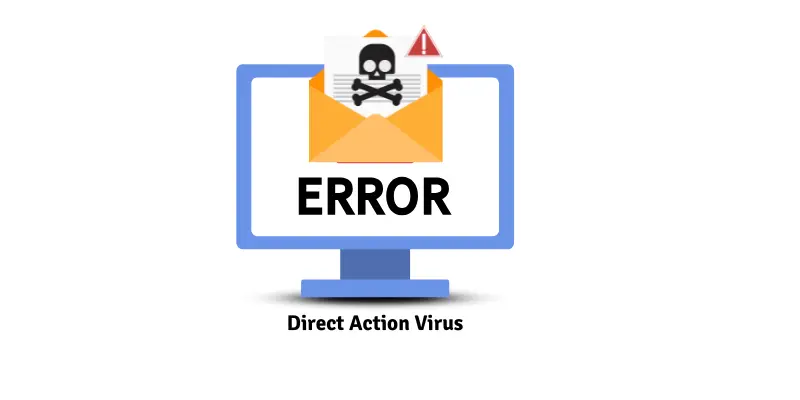
Polymorphic Virus
A polymorphic virus is a dangerous computer virus. It can change its code every time it spreads, making it hard to detect and remove. Antivirus software may not always catch it. Hackers use this virus to attack computers and steal data.
Examples:
- Storm Worm: This virus spread through email attachments, and its code was changed to avoid detection.
- Virlock: This virus locked files and kept changing to escape antivirus programs.

Multipartite Virus
A multipartite virus spreads in many ways. It can infect both files and the boot sector of a computer. This virus spreads quickly and is hard to remove. Even if you delete the infected files, it may still exist in the boot sector. It can slow down your computer and damage your data.
Examples:
- Tequila Virus: It infects both files and the boot sector.
- Invader Virus: It spreads through files and hides in memory.
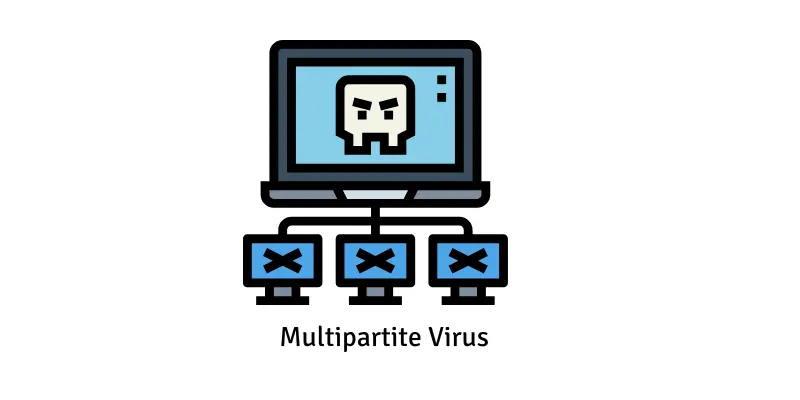
Macro Virus
A macro virus is a computer virus that hides inside documents like Word or Excel files. When you open the file, the virus starts working. It can spread to other files on your computer. Hackers use it to steal information or damage files.
Examples
- Melissa Virus: It spread through email attachments and infected Microsoft Word files.
- Concept Virus: It was the first macro virus that targeted Microsoft Word documents.

File Infector Virus
A File Infector Virus is a harmful program. It attaches itself to files on a computer. When you open an infected file, the virus spreads. It can damage your data and slow down your computer. Some file infector viruses can even delete important files.
Examples:
- CIH (Chornobyl Virus): This virus deletes files and damages computer hardware.
- Salty: This virus spreads through infected files and weakens system security.
Overwrite Virus
An Overwrite Virus is a type of virus that deletes the original data in a file. It replaces the data with its own harmful code. This virus spreads quickly and damages important files. Once infected, the original data cannot be recovered. The only way to remove this virus is to delete the infected files.
Examples:
- Way Virus: This virus infects.COM and .EXE files, making them useless.
- Trj.Reboot: It overwrites system files and causes the computer to restart repeatedly.
Spacefiller Virus (Cavity Virus)
A Spacefiller Virus, also called a Cavity Virus, is a special type of computer virus. It does not increase the size of a file like other viruses. Instead, it hides in empty spaces inside a file. This makes it harder to detect. The virus can still damage files and programs without making them look different.
Examples:
- Lehigh Virus: It infects EXE files without changing their size.
- Stealth Virus: It hides in system files and avoids detection.
Rootkit Virus
A Rootkit Virus is a dangerous type of virus. It hides deep inside a computer. It is very hard to find and remove. Hackers use it to control a computer secretly. They can steal data or change system settings without the user knowing.
Examples:
- Zacinlo: This virus hides and steals data from computers.
- Necurs: Hackers use this virus to send harmful emails.
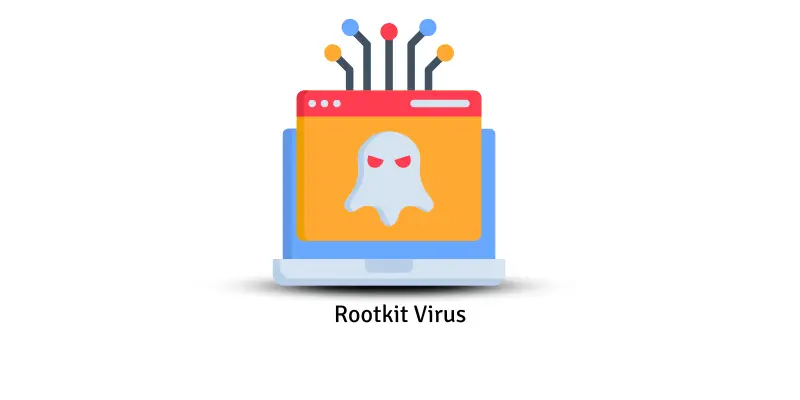
Firmware Virus
A Firmware Virus is a harmful program that infects a computer’s firmware. Firmware is special software stored in hardware parts like the BIOS or motherboard. This virus hides in the firmware and stays even after reinstalling the operating system. It can damage hardware or control the system without being detected.
Examples:
- MoonBounce: A firmware virus that hides in the BIOS and is hard to remove.
- LoJax: It infects the motherboard firmware and survives system resets.
Adware
Adware is a type of software that displays unwanted ads on your computer. It is not exactly a virus, but it works like one by slowing down your system and tracking what you do online. Adware often appears when you install free programs. It shows ads based on your internet activity. To protect your computer, you can use antivirus software to remove adware.
Examples:
- Fireball: This adware shows pop-up ads and tracks the websites you visit.
- DollarRevenue: It adds unwanted website ads and can slow your internet.
Spyware
Spyware is a virus that hides inside your computer. It watches what you do without asking. It can steal your personal information, like passwords and bank details, and make your computer slow. You should use antivirus software to stay safe.
Examples:
- CoolWebSearch: This spyware changes your web browser and shows unwanted ads.
- Gator (GAIN): It tracks what you do online and sends data to advertisers.
Ransomware
Ransomware is a virus that locks your computer and asks for money to unlock it. If you don’t pay, you might lose your files. This virus can make your computer stop working. It is very dangerous and can cause a lot of problems.
- WannaCry: This ransomware locked many computers worldwide and asked for money to fix them.
- CryptoLocker: It encrypts your files and asks for money in exchange for a decryption key.
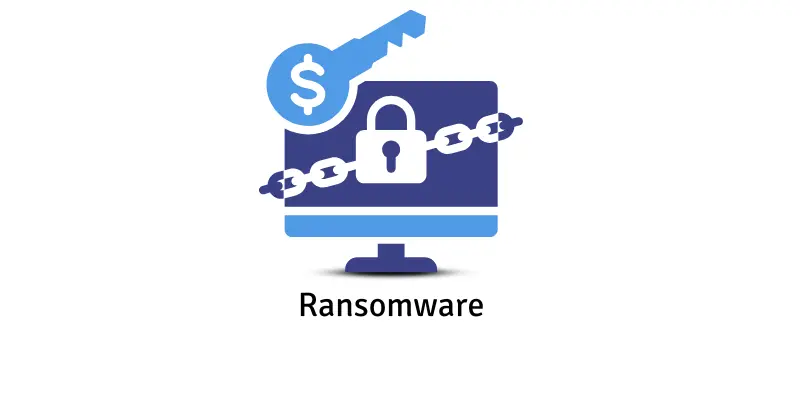
Trojan Horse
A Trojan Horse virus looks like a helpful program but is actually harmful. It tricks you into opening it, and once you open it, it can damage your files or steal your information. The virus hides inside the program and works secretly. Always be careful before downloading programs from the Internet.
Examples:
- Fake Antivirus Program: This Trojan looks like an antivirus but steals your personal information.
- Online Game Cheats: These Trojans pretend to give free cheats but secretly damage your computer.
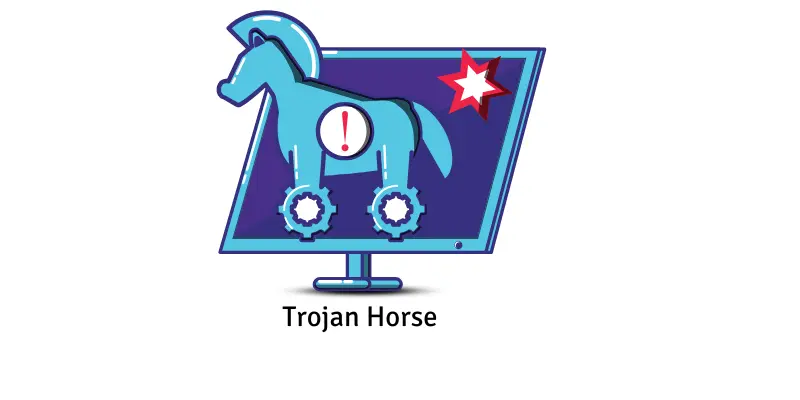
Computer worms
Worms are a type of virus that can spread quickly. They move from one computer to another without your help. Worms can spread to other devices through your internet connection. They can slow down your computer or cause it to crash. It’s important to have strong security to stop worms.
Examples:
- ILOVEYOU Worm: It spreads through emails and damaged files on many computers.
- Conficker Worm: It spread quickly and infected millions of computers worldwide.
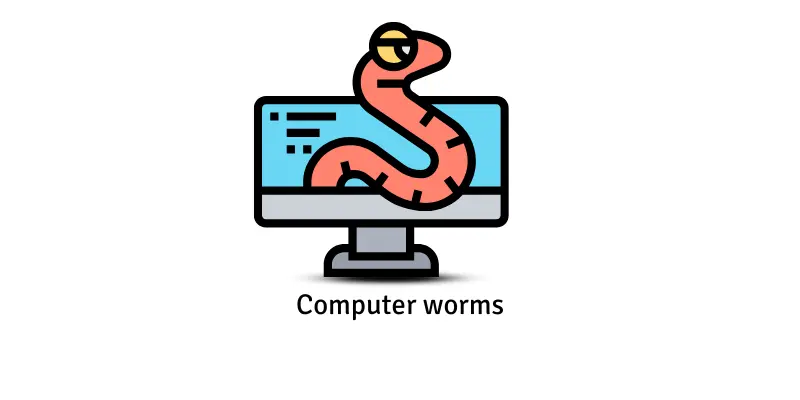
Logic Bomb
A Logic Bomb is a harmful virus that stays hidden inside a computer and activates when a specific action occurs. This virus can delete files or damage the system, and hackers use it to cause serious problems.
Examples:
- Time Bomb: This virus activates on a set date and deletes important files.
- Email Triggered Bomb: It starts working when you open a specific email.
Web Scripting Virus
A Web Scripting Virus attacks web pages, hiding inside them and infecting visitors’ computers. This virus can steal personal data like passwords and credit card numbers, change web pages, and show fake content. Always use a good antivirus to stay safe.
- Samy Worm: This virus spread through social media and hacked user accounts.
- Cross-site scripting (XSS) allows hackers to steal data from website users.

Browser Hijacker Virus
A Browser Hijacker Virus changes your web browser without permission. It sets a new homepage and search engine. It shows many unwanted ads. This virus can also track what you do online. You should remove it quickly to keep your computer safe.
Examples
- Ask Toolbar: It changes your search engine and shows extra ads.
- CoolWebSearch: It redirects you to unsafe websites and steals your data.
Network Virus
A Browser Network Virus attacks web browsers. It changes settings without permission. This virus can open unwanted websites. It can also steal your personal information. You should always keep your browser updated to stay safe.
Examples:
- CoolWebSearch: This virus changes your homepage and fills your browser with ads.
- Zeus Virus: It steals your banking details when you enter them online.
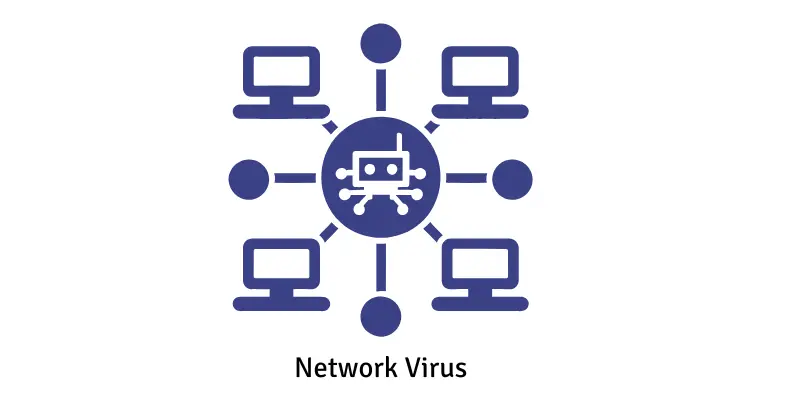
Conclusion
So, guys, it’s time to finish up! In this article, we’ve covered 20 types of computer viruses in detail. These viruses can harm your data, slow your computer, and even steal personal information. My advice is to update your software regularly and use strong passwords to keep hackers away. Cyber threats are growing, and staying informed is the key to safety. Don’t forget to bookmark this page and check out my other articles on computer security!
FAQs about Types of Computer Viruses
Here are some common questions about types of computer viruses
Computer viruses spread through unsafe downloads, email attachments, and malicious websites. They can also spread when you plug in infected USB drives. Always scan files before opening them.
Some viruses, like spyware and keyloggers, can steal passwords and bank details. They secretly collect your data and send it to hackers. Using a good antivirus helps protect your information.
Your computer may slow down, crash, or show pop-up ads. Files may go missing, or programs may not work properly. If you notice these signs, run an antivirus scan immediately.
Ransomware is one of the most dangerous viruses. It locks your files and demands money to unlock them. To stay safe, avoid clicking on unknown links.
Use a trusted antivirus program and update your software regularly. Avoid downloading files from unknown sources. Be careful when clicking on email links or ads.
Yes, some viruses can delete important files or even damage the system. If a virus attacks your hard drive, you may lose everything. Regular backups can help you recover lost data.
Some free antivirus programs offer basic protection. However, paid versions provide stronger security and extra features. Choose a trusted brand to keep your device safe.
Yes, smartphones can also get viruses. Download apps only from official stores and avoid clicking on unknown links. Installing a mobile security app can help protect your phone.
Run a full antivirus scan and remove any threats found. If the virus is serious, you may need to reset your system. Keeping backups will help you restore your files easily.

- Be Respectful
- Stay Relevant
- Stay Positive
- True Feedback
- Encourage Discussion
- Avoid Spamming
- No Fake News
- Don't Copy-Paste
- No Personal Attacks

- Be Respectful
- Stay Relevant
- Stay Positive
- True Feedback
- Encourage Discussion
- Avoid Spamming
- No Fake News
- Don't Copy-Paste
- No Personal Attacks
